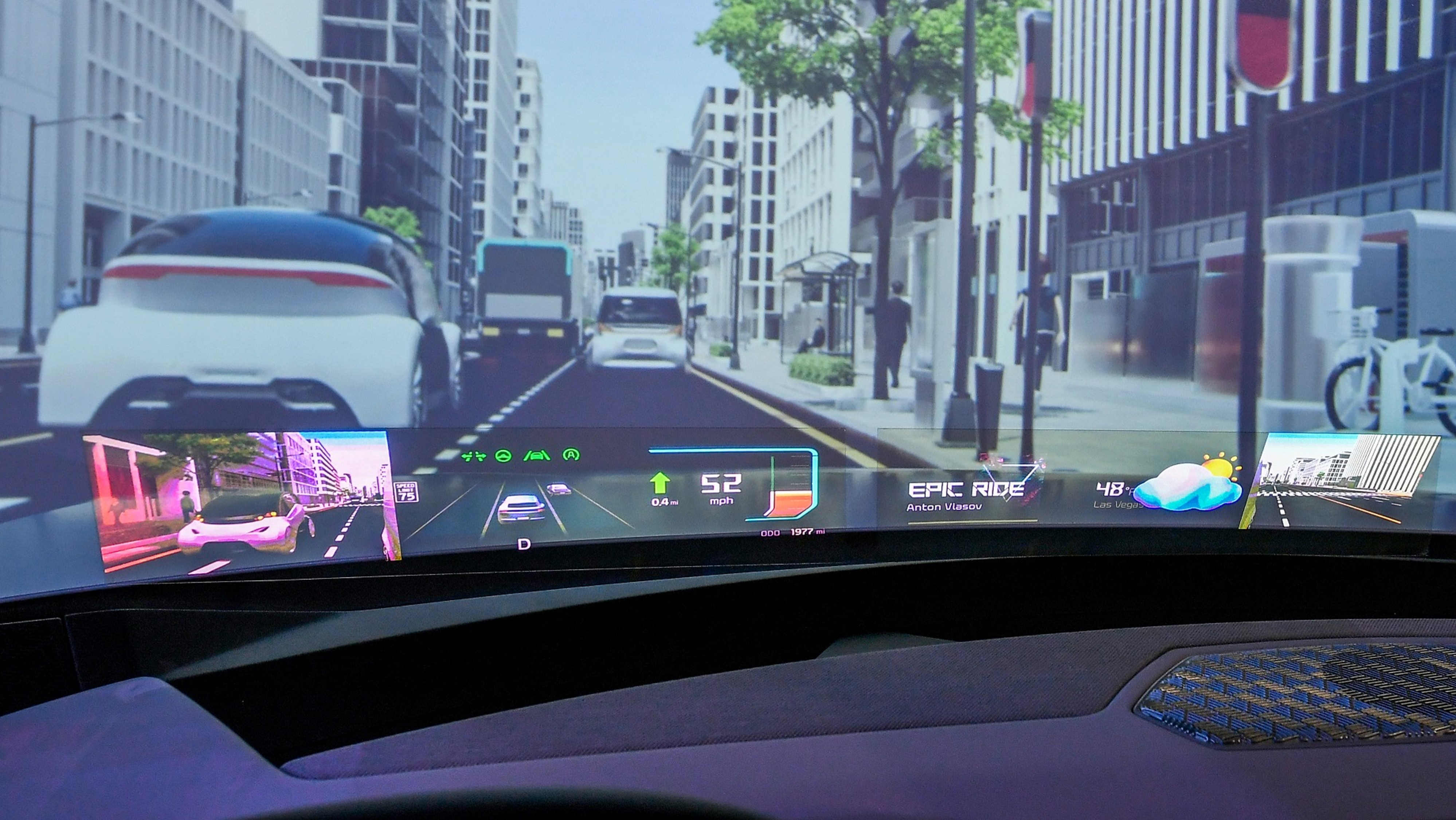
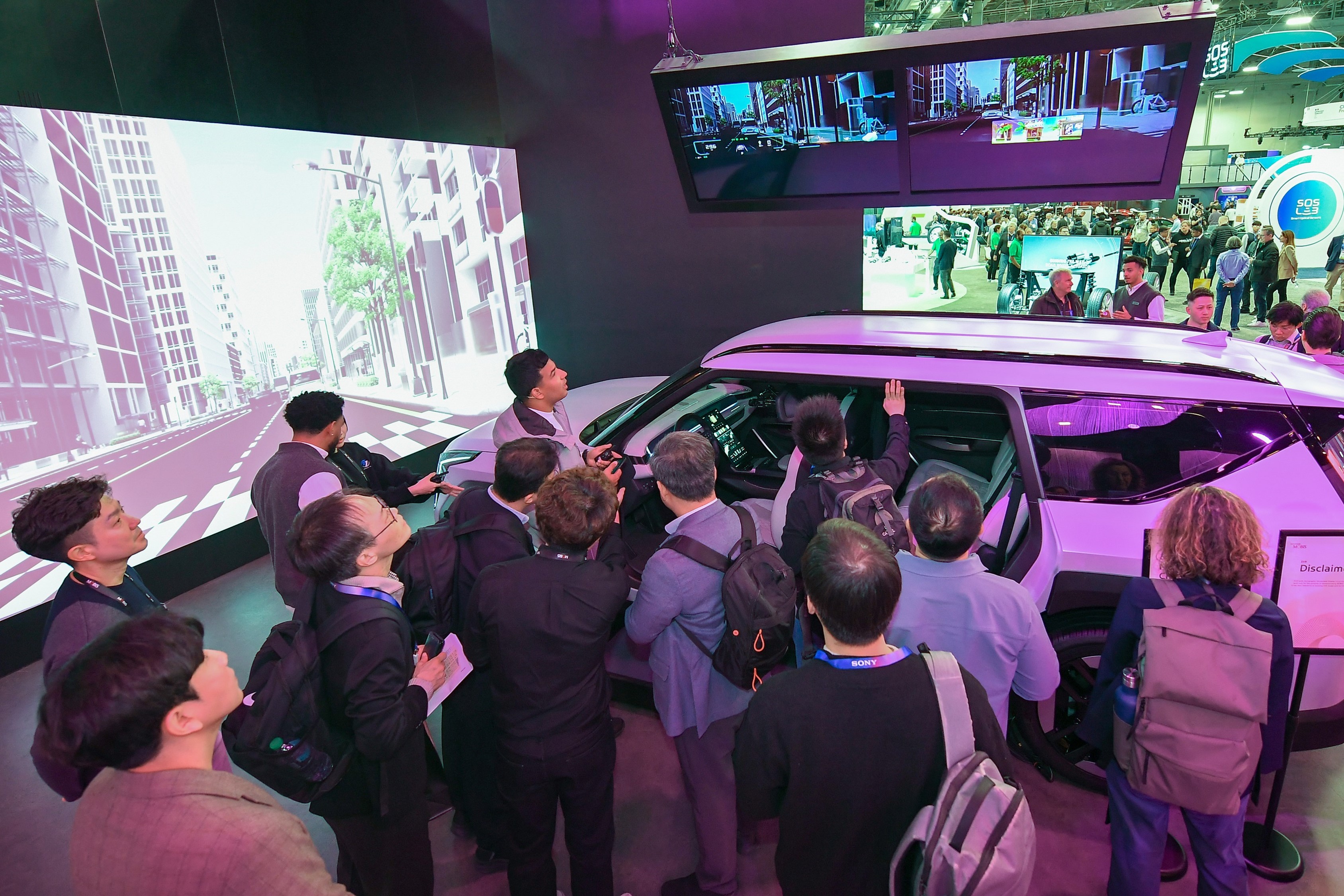
LAS VEGAS, JAN. 8th, 2025 This year’s CES saw another big innovation in in-vehicle display. It’s the advent of a new in-vehicle display technology without any display device: the so-called holographic display, and it’s completely different from conventional in-vehicle display.
Hyundai Mobis unveiled its ‘holographic windshield display’ technology, which transforms the vehicle’s front windshield into a transparent display, at the world’s largest tech event, CES 2025. Embedded with this holographic windshield display, Kia’s electric vehicle EV9 offered a unique user experience a live demonstration to CES 2025 visitors.
Recently, the in-vehicle display market has been shifting towards user experience innovation, for instance, towards a large screen, high-definition graphics, new technologies (including 3D and AR), and a privacy mode. Even the design is being uniquely modified to add a special interior feel to the vehicle. Global automakers are increasingly adopting advanced displays with various features to establish a distinctive brand image.
The key feature of Hyundai Mobis’s new holographic windshield display technology is that it transforms the vehicle’s front window into a transparent screen, without additional device. That means, there will not be any display devices placed in the driver’s and passenger’s seats, but instead, all kinds of content, including driving information, navigation and music playlists, will be vividly displayed at the bottom of the front windshield. From the outside, it looks like a transparent glass window, but it presents a clear display for the driver and passengers even in bright outdoor environments through high brightness and color reproduction.
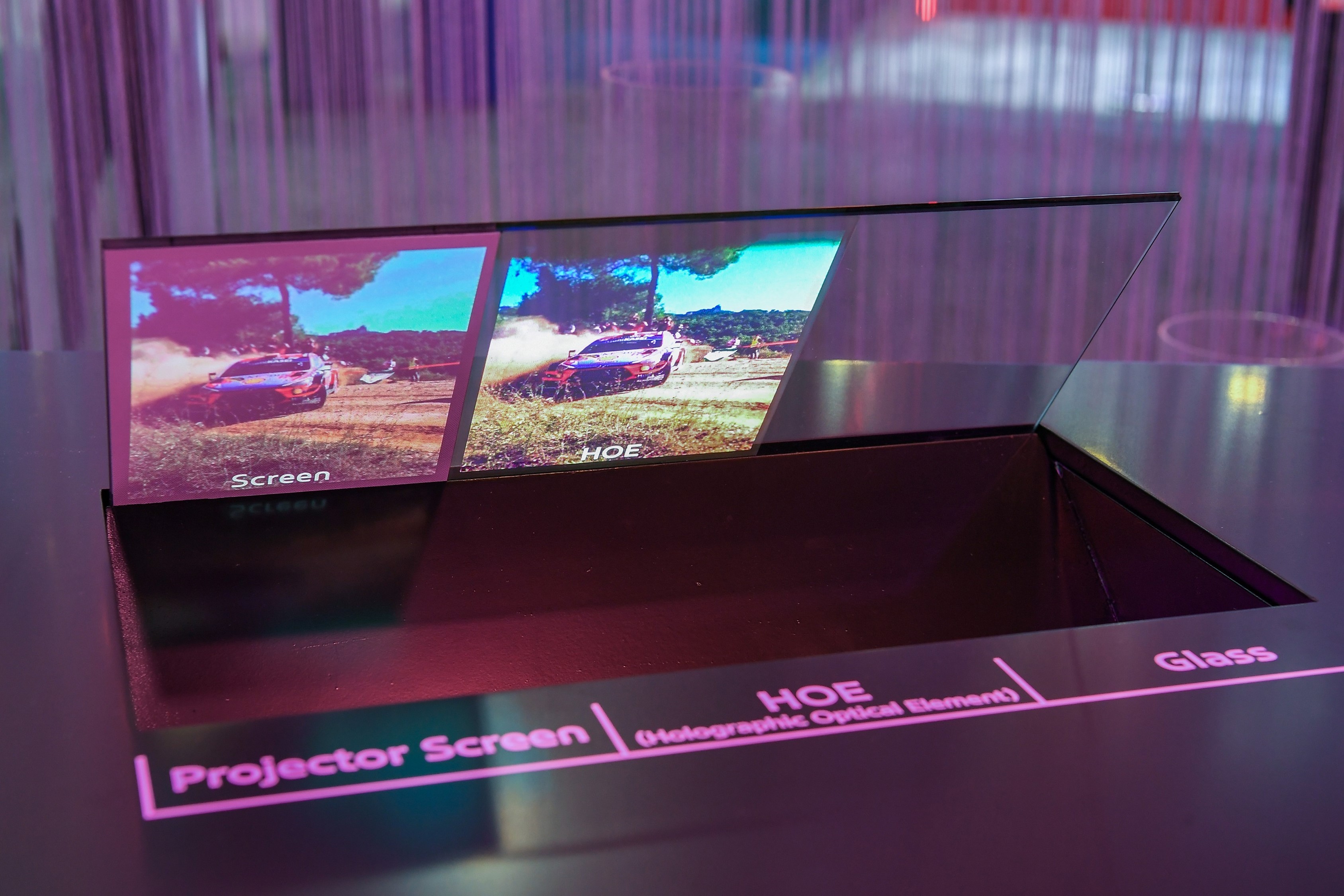
Holographic Heads-Up Display by Hyundai Mobis at CES2025
Innovation etched into the windshield: The only technology to use the entire windshield as a screen
The ‘holographic windshield display’ technology projects images and videos anywhere on the vehicle’s front windshield as needed. And that’s possible owing to a special film that uses an optical component called HOE (Holographic Optical Element). Unlike a conventional screen, this film uses the principle of diffraction of light (the bending of light from its original path to reach its destination) to efficiently deliver images and videos projected from the projector to the eye position of persons in the driver’s and passenger’s seat. It also offers a privacy display mode that prevents a person in the driver's seat from seeing the screen before another person in the passenger’s seat.
Depending on where the film is placed, for example, the top, bottom or side of the windshield, this holographic display can be implemented anywhere. Suppose that a user places the film on the side of the windshield: in that case, it can work like a smartphone’s curved edge screen. It is said that the holographic windshield display is the only technology among all in-vehicle display technologies to transform the entire front window into a display as needed.
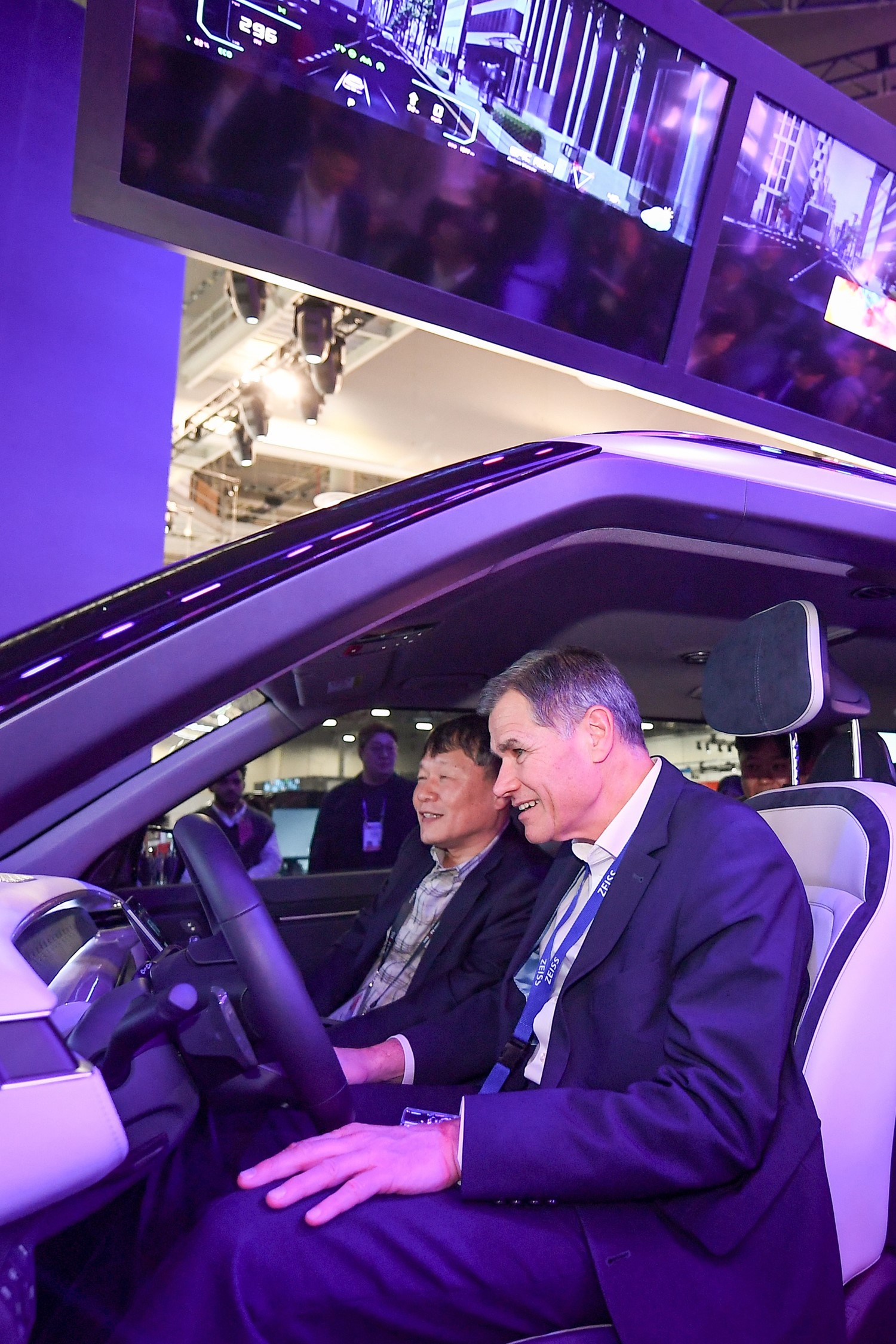
Lee Gyu Suk, CEO of Hyundai Mobis and Karl Lamprecht, CEO of ZEISS at CES
A joint work of Hyundai Mobis and German ZEISS, both company CEOs having emphasized their close cooperation
Hyundai Mobis is teaming up with world-renowned German optical company ZEISS for the development of this advanced and not-yet-mass-produced display technology. Both companies intend to enhance their technological synergy and complete pre-development by the first half of next year, with the goal of launching the product for mass production as early as 2027. The CEOs of both companies are taking great interest in this project. Lee Gyu Suk, CEO of Hyundai Mobis, and Karl Lamprecht, CEO of German ZEISS, met at Hyundai Mobis’s CES 2025 booth, underscoring the strength of their partnership. They together looked into the holographic windshield technology and discussed plans for further business cooperation. Both companies aim to deepen their collaboration by focusing on advanced solutions for driver and cabin monitoring systems as well as innovative augmented reality display technologies.
As such, Hyundai Mobis is consistently putting effort into strengthening its technological edge in premium in-vehicle displays targeting the global market. Its premium product portfolio includes the big and slim high-definition QL Display, the 34-inch curved Swivel Display, and the Rollable Display.
“Hyundai Mobis will target the global market with its market-leading technology and high-value-added products, and will actively introduce various new technologies”, said Lee Gyu Suk, CEO of Hyundai Mobis.
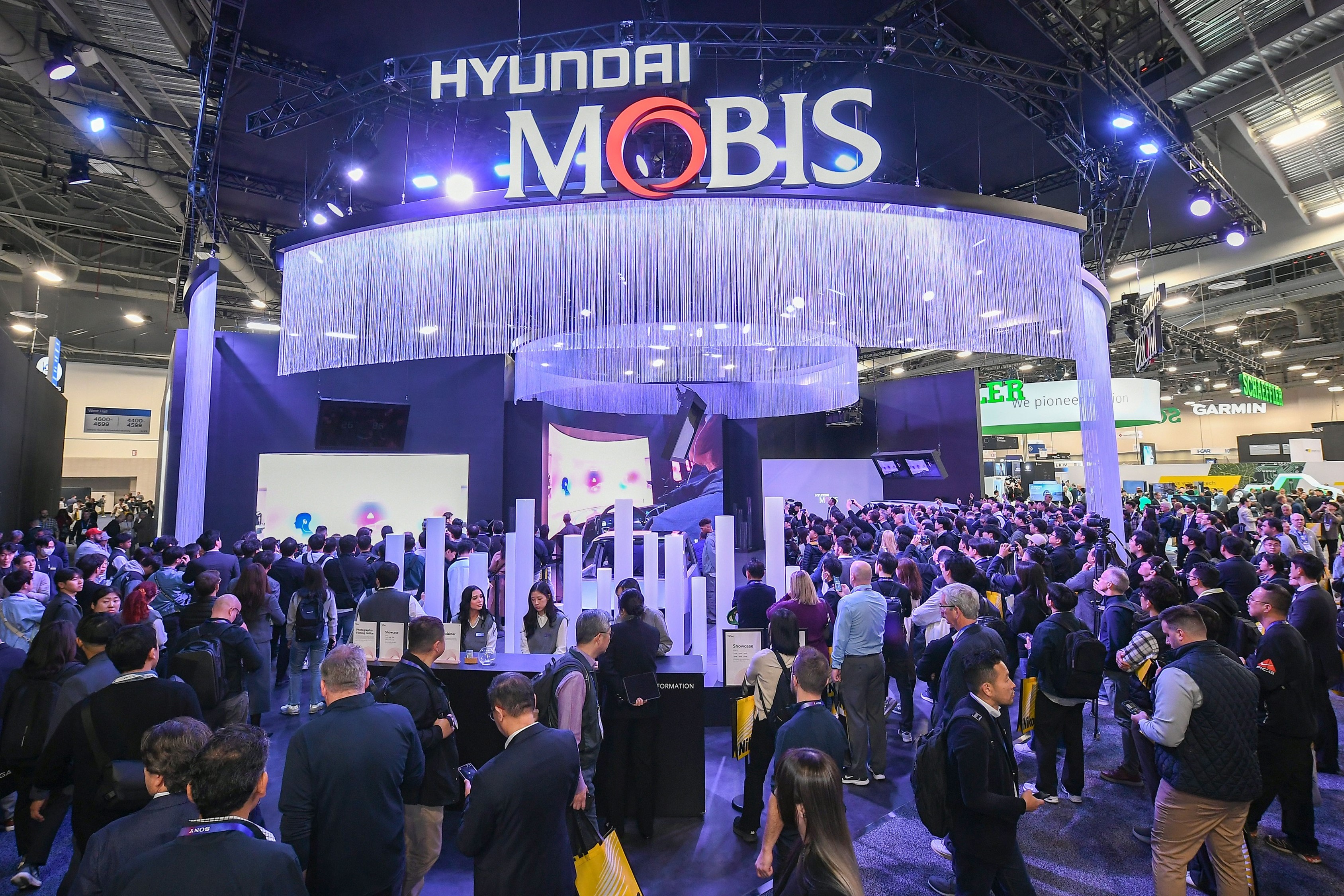
Hyundai Mobis at CES2025
Global clients invited to CES 2025 for sales of Hyundai Mobis’s high-value-added products
Hyundai Mobis invited its global clients to its booth at CES 2025 and showcased, mostly, its high-value-added products. It had over 30 meetings with clients from around the world invited to this CES. Hyundai Mobis set up a special private zone within its booth to actively engage with clients through the showcasing of its 16 strategic products including electrification components, vehicle electronics, chassis and lamps for global business opportunities.
Further, Hyundai Mobis invited about 40 Korean and international students studying at prestigious engineering schools in the US including MIT, Standford and the Georgia Institute of Technology, and provided them with chances to experience its key exhibits including the holographic windshield display and Human-centric Interior Lighting and learn about its products and competitive edge in future technologies. This was a part of Hyundai Mobis’s global talent recruiting program, which aims to expand its network with students in close association with CES and boost its visibility in the global market to attract top talent in the future.
(Photo credit: Hyundai Mobis)
TrendForce 2024 Global Automotive LED Market- Lighting and Display Product Trend
Release Date:
1. PDF (180 Pages)- 30 June 2024
2. EXCEL- 30 June 2024 and 31 December 2024
Languages: Traditional Chinese / English
|
If you would like to know more details , please contact:
|
















